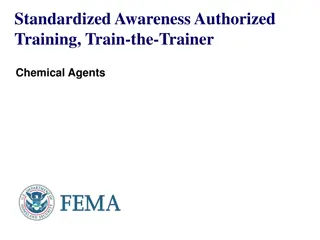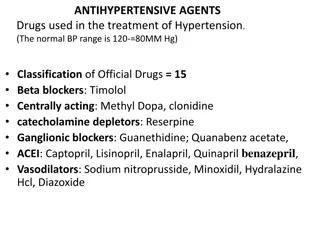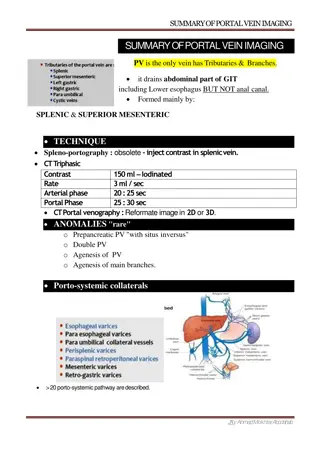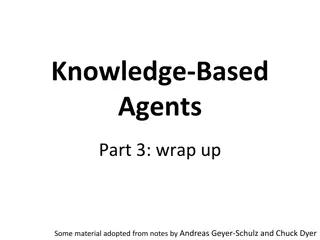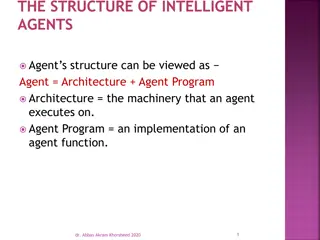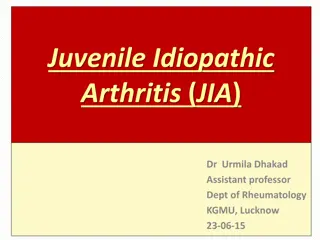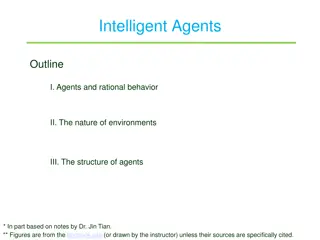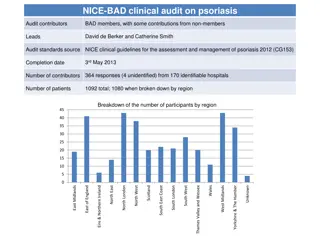Challenges in AI Agents
The common problems faced by AI agents such as lack of memory, unrealistic stories, and inability to proactively find users. Discover how to engage AI agents effectively and address major challenges like multi-modality and cost evaluation.
2 views • 18 slides
Understanding Adrenergic Agents in Pharmaceutical Chemistry
Adrenergic agents play a crucial role in pharmacology by influencing the sympathetic nervous system through adrenergic receptors. These agents, such as sympathomimetics and sympatholytics, impact essential functions like cardiac activity, blood vessel dilation, and insulin release. Adrenergic neurot
0 views • 120 slides
Prevalence of KIT D816V Mutation in Patients with Systemic Mast Cell Activation
This study presents findings from the PROSPECTOR clinical trial on the prevalence of the KIT D816V mutation in the peripheral blood of patients with systemic mast cell activation. The study involves multiple centers globally and sheds light on the significance of this mutation in systemic mastocytos
5 views • 14 slides
Roles and Responsibilities in Political Party Campaigning and Advertising
Roles and responsibilities in political party campaigning and advertising involve tasks such as soliciting contributions, coordinating fundraising activities, arranging financing, ensuring compliance with electoral budgets and spending limits, managing election expenses, maintaining accounting syste
2 views • 49 slides
Chemical Agents Awareness Training Overview
This training module covers standardized awareness and authorized training on chemical agents, including toxic industrial chemicals, riot control agents, and chemical warfare agents. Participants will learn about the physiological signs/symptoms, advantages/disadvantages of using chemical agents for
1 views • 20 slides
Understanding Fungi Diversity and Infections in Microbiology
Explore the world of fungi and fungal infections in this foundation block of microbiology. Learn about medically important yeasts, mold fungi, major fungal diseases, antifungal agents, and infection acquisition methods. Dive into hypersensitivity reactions, mycotoxicoses, and various types of fungal
1 views • 19 slides
Overview of Antihypertensive Agents and their Mechanisms of Action
Explore the classification of antihypertensive agents used in treating hypertension, including beta blockers, centrally acting agents, ganglionic blockers, ACE inhibitors, vasodilators, and more. Learn about the Renin-Angiotensin System, ACE inhibitors, and specific drugs like Captopril and Benazepr
0 views • 9 slides
Exploring Logical Agents and Architectures in Wumpus World
Explore the use of logical agents in the Wumpus World domain through three agent architectures: reflex agents, model-based agents, and goal-based agents. Understand how these agents operate in the challenging environment of the Wumpus World, where the task is to find the gold, return to starting pos
0 views • 21 slides
Understanding Film Forming Agents for Tablet Coating in Pharmaceuticals
Film forming agents play a crucial role in tablet coating, providing mechanical strength and desired film characteristics. Non-enteric film formers like HPMC, MHEC, EC, HPC, Povidone, SCMC, and PG Acrylate Polymers are commonly used for uniform film formation. Each agent has unique properties and pr
1 views • 10 slides
Selection and Appointment of Foreign Sales Agents: A Comprehensive Guide
Learn about the process of selecting and appointing foreign sales agents in international marketing, including the meaning of agency, content of foreign sales agency contracts, reasons for appointing agents, factors influencing agent selection, as well as the advantages and disadvantages of working
0 views • 12 slides
Understanding Intelligent Agents in Artificial Intelligence
Intelligent agents in artificial intelligence act rationally to achieve the best outcomes in various environments. They operate autonomously, perceive their surroundings, adapt to changes, and pursue goals efficiently. Developing intelligent agents involves examining agents, environments, and their
1 views • 22 slides
Safe Practice Principles for Systemic Anti-Cancer Therapy (SACT) 2019
Systemic Anti-Cancer Therapy (SACT) involves chemotherapy and targeted agents for cancer treatment. Risks include errors with non-accredited staff, incomplete prescriptions, incorrect dosing, and patient education deficiencies. Safe practice principles emphasize specialist care, established protocol
0 views • 25 slides
Understanding Antineoplastic Agents in Pharmaceutical Chemistry
Antineoplastic agents, such as alkylating agents, target DNA or DNA replication to induce apoptosis in cancer cells. Alkylation of DNA can lead to cell death through various mechanisms, including p53 activation. Resistance to alkylating agents can develop in cancer cells. The process involves nucleo
1 views • 94 slides
Understanding Foliar Nutrition: Droplet Size and Wetting Agents
Foliar nutrition focuses on the effective entry of nutrients into plants through foliar applications. Key factors include droplet size for optimal absorption, the role of wetting agents in nutrient entry, and the importance of fertilizer materials with high solubility and purity. Smaller droplets en
0 views • 8 slides
Understanding Adjuvants and Herbicide Formulation
Adjuvants are additives that enhance herbicide effectiveness, crucial for optimal weed control. Types include surfactants, stabilizing agents, coupling agents, humectants, deposit builders, and more. Surfactants aid in wetting and spreading herbicides, stabilizing agents keep suspensions intact, cou
0 views • 10 slides
Understanding Azole Antifungal Agents for Veterinary Use
Azole antifungal agents play a crucial role in treating fungal infections in veterinary medicine. Imidazoles like clotrimazole and triazoles like fluconazole are commonly used for their fungistatic properties. These agents inhibit fungal enzymes, disrupting membrane fluidity and inhibiting cell repl
0 views • 14 slides
Important Changes for Marketplace Agents in the 2024 Final Rule
The 2024 Marketplace Final Rule brings significant changes affecting Marketplace agents. Agents must document consumer consent and confirmation of application details. Also, a longer HHS review period for agent rebuttals is introduced. Navigators and other assisters now have the option to enroll con
2 views • 8 slides
Understanding the Role and Importance of Diplomatic Agents
Dive into the world of diplomatic agents, exploring their history, classification, immunities, and privileges. Learn about the Vienna Convention on Diplomatic Relations, theories governing diplomatic relations, and the critical role these agents play in modern international affairs.
0 views • 17 slides
Understanding Systemic Steroids and Pulse Therapy in Dermatology
Systemic steroids, potent immunosuppressive and anti-inflammatory agents, play a crucial role in dermatological therapy. This article discusses the pharmacology, mechanism of action, cellular effects, and clinical applications of glucocorticoids. It covers topics such as cortisol synthesis, glucocor
0 views • 30 slides
Understanding the Impact of the Tenants Fee Ban on Landlords and Agents
The Tenants Fees Act bans all fees from letting agents and landlords to tenants, impacting the rental market significantly. This article explores what can be charged to tenants, reasons for using an agent, services provided by agents, and insights from landlords on the changing landscape post-ban. A
0 views • 13 slides
Understanding Agency Relationships in Business
Agency relationships in business involve principals appointing agents to act on their behalf. There are different types of agents, such as general agents, special agents, factors, brokers, del credere agents, confirming houses, and commercial agents. Each type of agent has specific roles and respons
0 views • 18 slides
Fighting Systemic Discrimination Through Litigation: A Legal Perspective
This content delves into the crucial role of litigation in combatting systemic discrimination, particularly in the context of under-representation of women in male-dominated work environments. It emphasizes the need for multiple strategies, including legal action, to address discriminatory barriers
0 views • 15 slides
Understanding Drug Analysis and Classification
Drug analysis is crucial in identifying and defining substances used for treatment. The definition, characteristics, and classification of drugs are outlined, including chemotherapeutic agents and pharmacodynamic agents. An ideal drug should be localized, non-toxic, efficient, and have minimal side
0 views • 19 slides
Oral Manifestations of Systemic Diseases in Dentistry
This content explores various systemic diseases and their oral manifestations relevant to dentistry. It covers associations between heart disease and periodontal disease, effects of chronic corticosteroid use on the pulmonary system, endocrine disorders like diabetes and thyroid issues, autoimmune d
1 views • 63 slides
Portal Vein Imaging Techniques and Anomalies Overview
Portal vein imaging is crucial for evaluating conditions affecting the abdominal part of the gastrointestinal tract. Techniques such as spleno-portography and CT triphasic contrast imaging are used to visualize the portal vein and diagnose anomalies like portal-systemic collaterals and porto-systemi
4 views • 7 slides
Understanding the Connection Between Oral Health and Systemic Diseases
The relationship between oral health and systemic diseases is significant, with manifestations within the oral cavity providing clues to underlying systemic issues. Disease processes involve aspects like etiology, pathogenesis, morphologic changes, and clinical significance. Organisms and toxins spr
0 views • 19 slides
Understanding Intelligent Agents in Chapter 2
This chapter delves into the concept of agents and environments in the realm of intelligent systems. It explores the types of agents, their functions, and interactions with environments. Rationality, performance measures, and the essence of being a rational agent are key aspects discussed. The vacuu
0 views • 28 slides
Analyzing Systemic Climate Risk in the Financial Sector
This study discusses systemic climate risk in the financial sector by examining the effects of climate risks on financial institutions. It aims to design a market-based framework to assess the vulnerability of financial institutions to climate risks and analyze potential contagion effects. The frame
0 views • 39 slides
2013 Membership Development Award: Young Agents Committee Success Story
The Young Agents Committee of the Independent Insurance Agents of Georgia, Inc., won the 2013 Membership Development Award for their outstanding recruitment and retention efforts. Their theme focused on perpetuation, increasing active membership by 36%. Through grassroots development, live registrat
0 views • 10 slides
Understanding Leavening Agents in Baking
This content delves into the importance of leavening agents in baked goods, discussing natural leavening agents, the chemical processes of baking soda and baking powder, the role of yeast leavening, and the differences between quick breads and other baked products. It also covers the leavening agent
0 views • 9 slides
Understanding Knowledge-Based Agents: Inference, Soundness, and Completeness
Inference, soundness, and completeness are crucial concepts in knowledge-based agents. First-order logic allows for expressive statements and has sound and complete inference procedures. Soundness ensures derived sentences are true, while completeness guarantees all entailed sentences are derived. A
0 views • 6 slides
Understanding Agents in OPM Workshop by Luc Moreau
Delve into the concept of agents in OPM Workshop facilitated by Luc Moreau. Explore the nature of agents, their differences from artifacts, causes of their behavior, and challenges in their utilization. Discover the role of enactors, executables, and workflows in generating and controlling agents. U
0 views • 5 slides
Understanding Gastrointestinal Agents: Acidifying Agents, Antacids, Saline Cathartics
Gastrointestinal agents such as acidifying agents, antacids, and saline cathartics are used to manage gastrointestinal disturbances. Acidifying agents like Hydrochloric Acid aid in gastric digestion, while antacids help reduce gastric acidity. Saline cathartics are used as laxatives. Achlorhydria, a
0 views • 36 slides
Understanding Peer Prediction Mechanisms in Learning Agents
Peer prediction mechanisms play a crucial role in soliciting high-quality information from human agents. This study explores the importance of peer prediction, the mechanisms involved in incentivizing truthful reporting, and the convergence of learning agents to truthful strategies. The Correlated A
0 views • 7 slides
Empowering Change: The Systemic Approach to Addressing Social Injustice
Explore the systemic change approach to combating unjust structures that oppress individuals living in poverty. Delve into understanding systems as interconnected wholes and the significance of systemic thinking in driving transformation. Uncover the complexities of social systems and the need to ac
0 views • 20 slides
Overview of Intelligent Agents: Structures and Types
The structure of intelligent agents consists of architecture and agent program. Different types of intelligent agents include simple reflex agents, model-based reflex agents, goal-based agents, and utility-based agents. Each type operates based on specific characteristics and methods to make decisio
0 views • 19 slides
Understanding Juvenile Idiopathic Arthritis (JIA) and Systemic Onset JIA (SOJIA)
Juvenile Idiopathic Arthritis (JIA) is arthritis of unknown origin that starts before the 16th birthday and lasts at least 6 weeks. It was previously known as juvenile rheumatoid arthritis (JRA). The diagnosis of JIA requires meeting specific criteria, and it can be classified into various subtypes
0 views • 52 slides
Understanding Intelligent Agents: Key Concepts and Rational Behavior
Intelligent agents operate based on perceptions, reasoning, and actions within various environments. Agents function through a sequence of percepts, utilizing programs to interpret their architecture. The Vacuum-Cleaner World serves as an illustrative environment for agent behavior, highlighting the
0 views • 31 slides
Psoriasis Clinical Audit Findings and Recommendations
This clinical audit on psoriasis evaluated various aspects such as nursing and psychological support, prescription of systemic agents, entry into BADBIR, availability of phototherapy services, and waiting times for PUVA and UVB treatments. The audit involved contributions from both members and non-m
0 views • 14 slides
Understanding Alkylating Agents in Oncology: Mechanisms and Pharmacokinetics
Alkylating agents have a long history as anti-cancer drugs, with Mechlorethamine being the first developed in 1942. They react with cells in all phases of the cell cycle, causing DNA alkylation and cross-link formation. Common alkylating agents include Cyclophosphamide, Melphalan, and Temozolomide.
0 views • 75 slides




